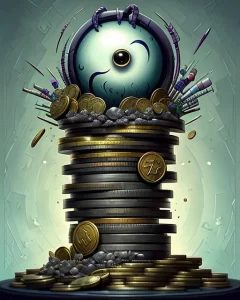The world of non-fungible tokens (NFTs) has exploded in recent years, attracting a surge of both enthusiasts and opportunists. While the NFT market offers a unique opportunity to invest in and own digital assets, it also harbors a growing number of scams and fraudulent schemes. It’s crucial to be aware of these pitfalls to protect yourself and your hard-earned money.
Understanding the Landscape of NFT Scams
NFT scams come in various forms, each designed to exploit unsuspecting buyers and collectors. The most common types include:
1. Rug Pulls:
Rug pulls are the most prevalent type of NFT scam, characterized by the sudden and abrupt disappearance of project creators, leaving investors with worthless tokens. These scammers often entice investors with promises of high returns or exclusive benefits, only to vanish after securing funds.
2. Phishing Scams:
Phishing scams prey on unsuspecting victims by impersonating legitimate NFT platforms or project websites. They lure individuals to enter their sensitive information, such as private keys or seed phrases, which are then used to drain their cryptocurrency wallets.
3. Counterfeit NFTs:
Counterfeit NFTs are digital copies of popular or valuable NFTs created without the original creators’ permission. These fraudulent tokens are often sold on marketplaces, misleading buyers into purchasing worthless copies.
4. Bidding Manipulation:
Bidding manipulation involves artificially inflating the price of an NFT through multiple accounts controlled by the scammer. This tactic creates a false sense of demand, enticing unsuspecting buyers to purchase the overpriced token.
5. Pump-and-Dump Schemes:
Pump-and-dump schemes target the hype surrounding new or upcoming NFT projects. Scammers artificially inflate the price of an NFT by spreading positive rumors or creating fake demand. Once the price reaches a peak, they sell their own holdings, dumping the price and leaving investors with worthless tokens.
Protecting Yourself from NFT Scams
To navigate the NFT landscape safely, it’s essential to be vigilant and adopt proactive measures to safeguard your investments. Here are some key tips to protect yourself from NFT scams:
1. Conduct Thorough Research:
Before investing in any NFT project, conduct thorough research on the team behind the project, their track record, and their plans for the future. Be wary of projects with anonymous or dubious developers.
2. Avoid Overhyped Projects:
Excessive hype and promises of unrealistic returns should raise red flags. Be wary of projects that heavily emphasize marketing and hype, rather than substance and tangible value.
3. Trust Reputable Marketplaces:
Stick to well-established and reputable NFT marketplaces that have implemented robust security measures. Avoid making transactions on unfamiliar or unverified platforms.
4. Protect Your Digital Assets:
Use strong passwords and enable two-factor authentication (2FA) for all your crypto wallets and NFT accounts. Never share your seed phrase or private keys with anyone, including project developers.
5. Stay Informed and Vigilant:
Keep yourself updated on the latest NFT scams and trends through reliable sources. Be wary of unsolicited messages or offers, and never click on suspicious links.
Navigating the NFT Landscape with Caution
The NFT space is constantly evolving, and new scams emerge regularly. By exercising caution, conducting thorough research, and using trusted marketplaces, you can minimize the risk of falling victim to NFT scams. Remember, vigilance and a proactive approach are your best defense against these fraudulent schemes.
Delving into Specific NFT Scams
While the above outline provides a general overview of common NFT scams, let’s delve into specific examples of these fraudulent schemes to gain a deeper understanding of their tactics and how to identify them.
Rug Pulls: The Silent Deception
Rug pulls are the most prevalent and devastating NFT scams, often causing significant financial losses to unsuspecting investors. These schemes typically involve a group of individuals creating an NFT project, generating hype, and then disappearing with investors’ funds once the project gains momentum.
Case Study: Frosties NFT Rug Pull
In January 2022, the Frosties NFT project emerged, offering a collection of 8,888 frosty ape NFTs. The project attracted a significant following, with over 8,000 NFTs sold within 18 minutes. However, just hours after the minting process, the project’s developers abandoned the project, deleting their social media channels and website. Investors were left with worthless NFTs and a trail of disappointment.
Phishing Scams: Baiting with Deception
Phishing scams in the NFT space are designed to trick individuals into revealing their sensitive information, such as private keys or seed phrases, which are then used to steal their cryptocurrency wallets and NFT assets. These scams often mimic legitimate NFT platforms or project websites, using URLs that are subtly altered to appear authentic.
Case Study: Fake Airdrop Scams
Phishing scams often exploit the concept of airdrops, which are free NFTs or cryptocurrency tokens distributed to users. Scammers create fake airdrop websites and social media posts, urging users to click on links or enter their wallet credentials to claim their “free” tokens. Once users provide their information, the scammers gain access to their wallets and steal their assets.
Counterfeit NFTs: Illusions of Value
Counterfeit NFTs are malicious copies of popular or valuable NFTs, often created without the original creators’ permission. These fraudulent tokens are then listed on legitimate marketplaces, misleading buyers into purchasing worthless replicas.
Case Study: Fake Bored Ape Yacht Club (BAYC) NFTs
In March 2022, a collection of counterfeit BAYC NFTs surfaced on OpenSea, the largest NFT marketplace. These fraudulent NFTs were designed to look identical to the original BAYC NFTs, but they lacked the authenticity and ownership rights associated with the real tokens.
Bidding Manipulation: Manipulating Market Perception
Bidding manipulation scams involve artificially inflating the price of an NFT through multiple accounts controlled by the scammer. This tactic creates a false sense of demand and scarcity, enticing unsuspecting buyers to purchase the overpriced token. Once the scam is exposed, the inflated price collapses, leaving buyers with worthless NFTs.
Case Study: Fake CryptoPunks NFT Auctions
In 2021, a series of fake CryptoPunks NFT auctions emerged on OpenSea. These auctions featured stolen images of CryptoPunks, but the tokens themselves were worthless. Scammers used these fake auctions to attract unsuspecting buyers and steal their cryptocurrency bids.
Pump-and-Dump Schemes: Preying on FOMO
Pump-and-dump schemes target the hype surrounding new or upcoming NFT projects. Scammers artificially inflate the price of an NFT by spreading positive rumors or creating fake demand, often through coordinated social media posts or paid influencers. Once the price reaches a peak, they sell their own holdings, dumping the price and leaving investors with worthless tokens.
Case Study: Fake Metaverse NFT Schemes
In 2022, a series of fake metaverse NFT projects emerged, promising exclusive access to virtual worlds and lucrative opportunities. Scammers used these scams to attract investors, generating hype and driving up the price of their NFTs. Once investors were invested, the scammers would dump their own holdings, leaving investors with worthless tokens and no access to the promised metaverse benefits.
Conclusion: Empowering Informed NFT Investments
The NFT landscape is rapidly evolving, with both legitimate opportunities and emerging scams. By understanding the types of NFT scams and adopting proactive measures to safeguard your investments, you can minimize the risk of becoming a victim. Remember, diligence, caution, and informed decision-making are essential for navigating the NFT space safely and responsibly.






